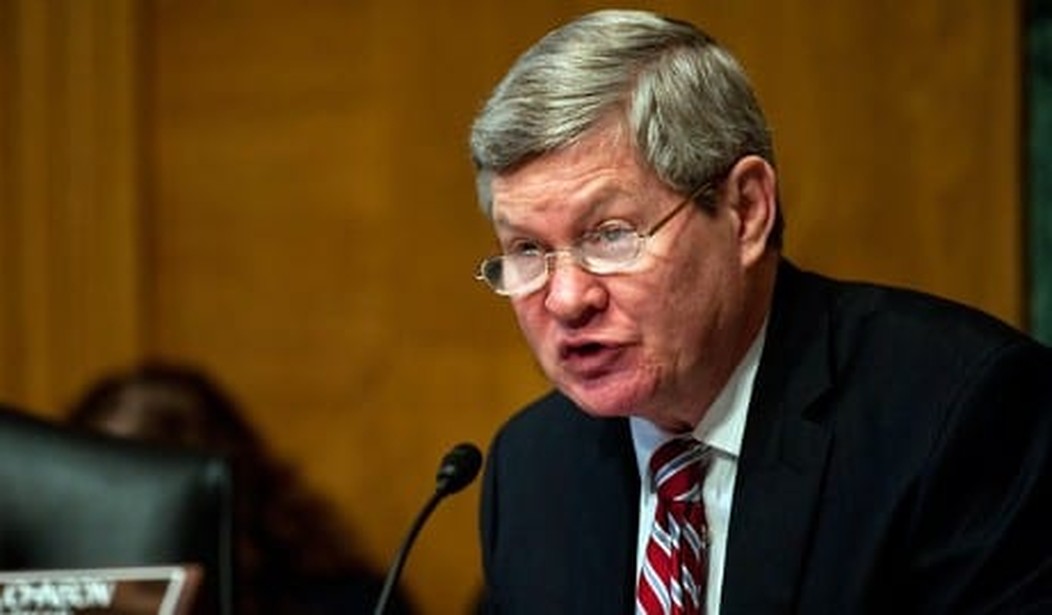South Dakota’s U.S. Senate race has been reduced from an octet to a quartet with the results of the state’s June 3 Republican primary.
Interestingly, however, three of the four members of the remaining quartet of candidates are all singing—or have sung—from the Republican songbook. That leaves the lone Democrat, Rick Weiland, who many South Dakota pundits wrote off just a month ago, with a puncher’s — or is it a tenor’s? — chance in the November general election.
Former South Dakota Gov. Mike Rounds emerged from the quintet of GOP candidates with 55 percent of the vote—about the same percentage that he received in his previous two statewide races for governor. The other four all ran to the right of Rounds.
While three of Rounds’ four Republican opponents have endorsed him postelection, the third-place finisher, state Rep. Stace Nelson, has so far carried out on his pre-election threat to not endorse Rounds. Nelson polled nearly 18 percent of the low turnout primary (31 percent on the Republican side) and supports former Republican state Sen. Gordon Howie of Rapid City, a tea party stalwart in the state—and an independent candidate for the Senate.
Nelson was a harsh critic of Rounds in primary debates and news conferences. The former Marine blew the trumpet of “crony capitalism” against Rounds. He also harped that Rounds was responsible for the EB-5 visa scandal involving Chinese and Korean investors and a failed beef packing plant in Aberdeen. Rounds championed the visa program as a means to finance the plant during his term.
Weiland, who has visited all 311 towns in South Dakota and sings a solo in favor of expanding Obamacare and decreasing income inequality and “crony capitalism,” should be a beneficiary of the Republicans’ rifts. However, he has yet to receive Democratic Senate Campaign Committee support—he wasn’t even listed as a candidate on the dscc.org website as of June 11. And surprisingly, he faces his own Republican problem—from the center left—from former Republican U.S. Sen. Larry Pressler.
Pressler polled 18 percent in a recent Rasmussen poll, putting him in striking distance of Weiland at 29 percent, who in turn is within striking distance of Rounds at 44 percent. “Some other candidate,” presumably Howie, polled 2 percent, and 7 percent were undecided.
The poll has come into question because the same poll listed Weiland as the Democratic candidate against Republican Gov. Dennis Daugaard in the gubernatorial race.
But nothing wins like winning.
FiveThirtyEight.com upped the former two-term governor’s chances of winning the Senate seat from 90 to 95 percent following the June 10 Virginia primary. Rounds also has raised over $3 million already, has over a million dollars in the bank, and is raising more from his chorus of donors.
Without knowing the cross tabulations from the recent polling, it is difficult to accurately determine if Pressler hurts Rounds or Weiland more. Some observers call it a draw, with the tie going to Rounds with his healthy but not insurmountable lead. But no one knows for sure.
On paper at least, Weiland is running against three prominent Republicans, which could give him the advantage—and the plurality necessary to hold retiring Sen. Tim Johnson’s Democratic seat.
“It has the potential for that,” says Rick Knobe, longtime Sioux Falls talk show host at KSOO-AM and a former two-term mayor of Sioux Falls. “But the pollsters say otherwise but pollsters can be wrong,” he noted the day after House Majority Leader Eric Cantor unexpectedly lost his primary race in Virginia.
Knobe sees Pressler—who has publicly supported Pres. Barack Obama in 2008 and 2012 and drifted leftward—as the wild card in a race where people are tired of politicians singing the same old songs.
“He needs to continually talk to people who are disaffected,” Knobe said.
Howie, according to Knobe, will likely hurt Rounds’ right flank, but Knobe thinks the “West River” (west of the Missouri River) tea party leader “won’t come across the Missouri River” to the more populated eastern part of the state.
But South Dakota’s most prominent Republican blogger and political operative sees Howie’s insurgency as a problem for Rounds—and as an “unwitting pawn of the Democrats.”
“The only way a Democrat can win is to hope for a Gordon Howie surge,” Pat Powers of the South Dakota War College blog writes. “The only way that Democrats stand even a shadow of a chance to do anything in the race is to bleed votes off Mike Rounds.”
Unlike Knobe, Powers thinks Pressler has topped out at 18 percent and “will quickly start to fall.”
Nonetheless, despite all the talk about Pressler, he’s raised little money—about $10,000 in the first three months of 2014—and appears to have no discernible organization.
Still, whether Pressler will try to raise money and do all the retail things South Dakotans expect—like ride in Fourth of July parades on his old John Deere tractor, canvas door-to-door, and stand in the September heat and dust shaking hands at the state fair in Huron—is an open question.
However, just nine days after the South Dakota primary, the Aberdeen American News’ Bob Mercer—the “dean” of the state’s political press corps—sounded a discordant note, writing that Democrat Weiland should quit the race and throw his support to independent Pressler.
“The Pressler candidacy however seems to be capturing the middle that Weiland hasn’t been able to crack,” Mercer writes. “Rounds might or might not reach 50 percent with Pressler and Howie in the race. Howie doesn’t affect Weiland, but Pressler does. Weiland might or might not break 35 percent.”
Mercer gives Weiland credit for working hard on the campaign trail, but says the two-time loser of House races in 1996 and 2002 is “bumping against his political ceiling.”
Further, Mercer notes that state Democrats would welcome the former Republican Pressler.
“Each day that Rick Weiland continues in the race is better and better news for Mike Rounds,” Mercer writes.
That thought is just out of tune to the state’s most prominent Democratic blogger, Cory Allen Heidelberger of the Madville Times.
“Weiland can win by doing more of what he’s doing: touring the state, shaking hands, making the sale face to face, one-on-one,” Heidelberger argues. “He does need to step up fundraising and fight the media war with Rounds.”
In the chromatic that is the U.S. Senate race in South Dakota, Heidelberger says Pressler dampens Rounds’ chances because of the Republicans’ intraparty key pounding.
“There are more anti-Rounds folks in the South Dakota GOP than there are anti-Weiland folks in the South Dakota Democratic Party,” Heidelberger notes. “Among party voters, Pressler does more damage to Rounds.”
But coming out of the June primary, Gov. Rounds has both the score on the scoreboard and on his music stand in his favor. Right now, Rounds wins in an operetta mostly of his own writing. Whether Weiland, Pressler or Howie can turn it into a full-blown opera where they take the final curtain call is doubtful.
But South Dakota’s “fat lady”—the voters—have yet to sing.
(For complete 2014 midterm coverage, get your campaign fix on The Grid.)









Join the conversation as a VIP Member